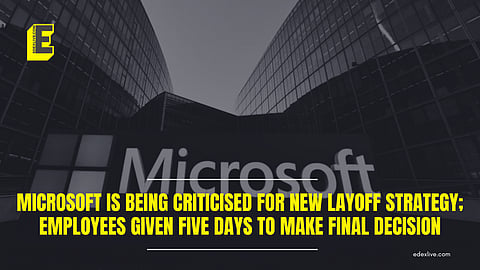

Microsoft has launched a revised performance management framework, introducing a voluntary payout option for underperforming employees as an alternative to entering a Performance Improvement Plan (PIP). The policy, which echoes Amazon’s controversial Pivot programme, has sparked discussions about its impact on employee wellbeing and workplace culture, reported the Economic Times, on Thursday, April 24.
Overview
Microsoft’s updated performance management strategy targets employees identified as “low performers,” offering them a choice between a PIP or a Global Voluntary Separation Agreement (GVSA) with 16 weeks of pay, to exit the company. According to the Business Insider, the policy aims to address performance issues transparently while providing employees with options.
The separation programme, being called the GVSA, at the company, will no longer be eligible for the payout and will have just five days to make a final decision, as per the report.
Key features of the strategy
- Voluntary payout: Low-performing employees can opt for a severance package equivalent to 16 weeks of pay instead of a PIP.
- Rehire and transfer restrictions: Employees leaving with low-performance scores (zero or 60% Rewards outcomes) or during/after a PIP face a two-year rehire ban, and are barred from internal transfers.
- Global considerations: The PIP process may vary outside the US due to differing labour regulations.
- Year-round implementation: As stated by Chief People Officer Amy Coleman, “This performance improvement process is available year-round so you can act quickly to transparently address performance issues, while offering employees choice.”
Comparison to Amazon’s Pivot program
The policy draws parallels to Amazon’s Pivot programme, which has faced criticism for prioritising termination quotas over employee growth. Amazon has defended its approach, claiming it equips managers with “tools to help employees improve their performance and grow in their careers.”
Industry trends
Microsoft’s move aligns with broader tech industry trends. Earlier in 2025, Meta laid off thousands of employees, placing terminated workers on “block lists” to prevent rehiring.
While Microsoft positions the policy as empowering employees with choice, critics warned it may undermine development efforts and create a high-stakes environment. The rehire ban and transfer restrictions could limit career mobility for affected employees.
Earlier this year, Microsoft reportedly banned around 2,000 employees who were marked as underperformers, who also did not offer any severance, after their performance levels were deemed as low after internal review assessments.
